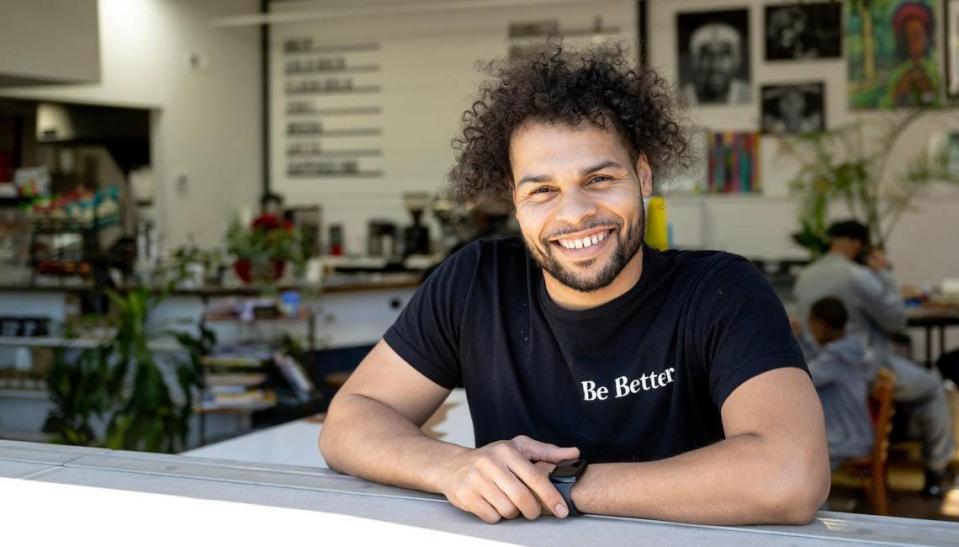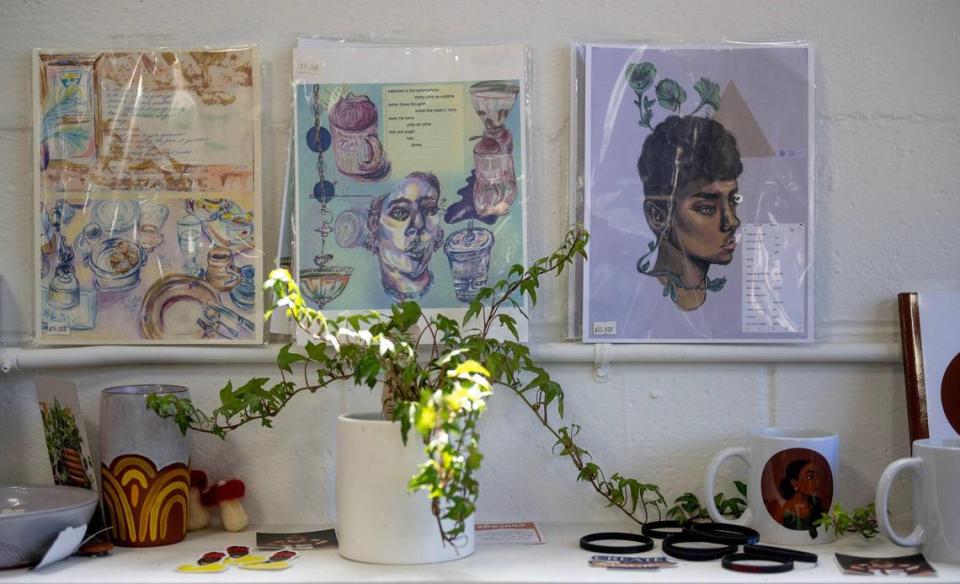‘It’s heartbreaking.’ Why parking rules threaten one of KC area’s few Black coffee shops
When he first peered through the windows of the defunct cupcake shop, T.J. Roberts instantly saw its potential.
Knock out a wall here, move the cash register over there and the place would be the perfect spot for a new coffee shop in downtown Kansas City, Kansas.
“I just kind of envisioned all of it,” said Roberts, who now owns Kinship Cafe. “I was like, this is the spot.”
But the future of the coffee house he transformed with his own hands is now in question. Not because the business is failing but because an out-of-state developer is considering using the property to meet the city’s strict parking standards.
Eagle Point Development already operates the 42-unit City Hall Lofts nearby. It’s proposing a six-story apartment building across the intersection, but has faced pushback over parking from the Board of Zoning Appeals, which reviews requests for exceptions from city zoning rules.
Eagle Point says it already has an excess of parking at its existing apartments there and it has secured parking agreements with nearby property owners. But the board is concerned there are too few parking spots and that they are too far away from the building.
So the developer is now in talks with the coffee shop’s landlord as a potential solution. Demolishing it, the thinking goes, may allow for construction of a new surface parking lot close enough and big enough to satisfy local officials.

It’s a stark example of the consequences of Kansas City, Kansas, parking requirements, which mandate the construction of one new parking space for every new housing unit added. Many cities across the country, including Kansas City, Missouri, have relaxed or eliminated such parking minimums. But efforts to modernize parking rules in place under the Unified Government of Wyandotte County/Kansas City, Kansas, have stalled.
Many urbanists argue that strict parking minimums for new developments drive up construction costs, discourage the use of mass transit and are contradictory to the dense, walkable neighborhoods many policymakers envision.
“More North American communities than ever are doing away with this destructive dinosaur of a policy, which enshrines the most wasteful use of urban land into public policy, imposing huge costs on cities in lost prosperity, affordability, accessibility, and quality of life,” the group Strong Towns wrote in a 2021 article heralding the many cities that have rethought their parking requirements.
Such debates around development policies can sometimes seem academic or theoretical.
But not for Roberts, who has suddenly found himself at the complex crossroads of development, parking and affordable housing policies.
Kinship Cafe is among only a handful of Black-owned coffee shops across the Kansas City metro area. Aside from Roberts’ own livelihood, the potential displacement threatens other entrepreneurs who have relied on his space to sell their products, host events and build community.
The landlord could not be reached by The Star. But Roberts said he is feverishly trying to raise enough money to match the $200,000 offer he was told the developer made on his building. Despite a long-term lease, his landlord has told him he may have to go if he is unable to match the other offer, he said.
“I feel like my world has kind of fallen apart,” he said in an emotional Instagram post outlining his predicament.
A GoFundMe page has raised more than $6,000 of its $50,000 goal to help Roberts purchase the building.
“I firmly believe it’s not over,” he said.
‘Sip with intention’
The way Roberts tells it, it was one thing after another when he was opening the coffee shop in 2021.
Some of the pricey kitchen equipment he purchased went kaput shortly after he started.
Plumbing wasn’t up to code, requiring repairs before he even opened the doors.
And then he unexpectedly lost his insurance job, which he was counting on as he got the business going.
“This became all I had,” he said from inside the shop that he renovated with his own two hands.
Kinship Cafe sits on the corner of North 6th Street and Ann Avenue, directly behind the towering City Hall building in downtown Kansas City, Kansas.
Rolling garage doors welcome the cool spring breeze. Inside, bright white cinder block walls are covered in the work of local artists. A narrow shelf is brimming with books for kids and adults to peruse.
Roberts got his start with coffee at the age of 10. At a church in Wamego, Kansas, the child of two pastors served coffee to the worship team at his family’s church.

Since the outset, this business has been about more than just coffee.
“Sip with intention” is the motto that guides Kinship, which sells ethically sourced beans and a myriad of Black-owned products. Those range from original artwork of Chiefs quarterback Patrick Mahomes to tropical house plants.
All of those are sold without a commission.
Victoria Campbell Osborne, who owns the fragrance company The Scented Webb, said Roberts has been a champion for small businesses getting off the ground. Aside from the products he sells in his shop, he’s made the space available for events like yoga and meditation.
Campbell Osborne got her business going with a popup at Kinship during KCK’s Third Friday Artwalk, which gave her exposure to hundreds of new customers.
“The fact that he provides this access to basically everybody in the community and all the things they do is unheard of for a coffeehouse,” she said. “It’s not like he’s a community development organization. He literally has become this de facto incubator purely because he believes in it.”
She’s disappointed that something as mundane as parking is threatening the business.
“It’s heartbreaking to me to think that anyone wouldn’t see the value in what he does,” Campbell Osborne said. “But the slap in the face to it is the fact that they’re not even taking it over to do something that is beneficial to people. (Parking) doesn’t put resources and time and effort back into that community.”

For now, Roberts is doing what he can to raise enough money to buy his building. He said Kinship’s cash flow is strong and growing, which may help him land lender financing. Owning an asset like property may even help him grow the business in the future, he said.
One thing is clear: he does not want to start over.
“When you put in so much work to get something started, the idea of starting fresh and starting anew if we are displaced is not right now fathomable for me,” he said. “It’s not something I have in me to do again if I’m being honest.”
How parking shapes development
Eagle Point Development has already received an award from the Kansas low income housing tax credits program to revamp its existing City Hall Lofts building and build 60 new units on a piece of green space east of the 7th Street Casino.
Based in Portland, Maine, the company has developed several apartment projects in Kansas City, Lee’s Summit and St. Louis.
Its latest plan will still require some UG approvals, but parking remains its biggest obstacle.
In February, the developer requested a variance from the UG’s Board of Zoning Appeals after it had secured more nearby parking spaces for the apartment development.
“It was the desire of the Unified Government as well as this developer not to keep building parking garages and parking lots but to provide affordable housing,” said Roger Barrett of Overland Park’s SK Design Group, which is working with Eagle Point on the project.
After a previous denial from the board, Barrett in February said that the company had worked with several UG officials to come up with more parking spaces. But he said not all those who rent low-income apartments have access to a car. He noted that only 14 of the 60 parking spaces at the existing apartment building are being used.
“Everyone is in agreement that we have solved the parking issues,” Barrett said. “The number of parking stalls in the ordinance was a little excessive for this type of development.”
But the board disagreed.
City rules currently mandate parking to be within 200 feet of the new apartments. But some of the spaces Eagle Point secured were more than 400 feet away.
Board member Aaron Ward said the parking setup posed a “safety issue” for residents of the new apartments.
“That’s a long ways away and obviously we know crime is higher downtown in this area,” he said.
Board member James Connelly said many people in low-income apartments are disabled and need to park close to their homes. He also said many tenants were unlikely to work, which could exacerbate parking problems near City Hall during the day.
“I don’t know if this is a reasonable place for them to build anyway,” he said.
The Board of Zoning Appeals denied Eagle Point’s request with a 5-1 vote.
That led the developer to look across the street.
“Given the parking that’s all around it seems a little bit more than is necessary but that is the code. So we’re scrambling trying to find a way to make it work,” said D.J. Nelson, president of the development firm. “We were just looking for other alternatives. That was never the original plan.”
He said the company never aimed at displacing Kinship Cafe.
The firm approached the landlord, Gant Enterprises, about the potential of selling. But it also was interested in building out a space for Kinship in the new apartment building, which will house retail space on the first floor.
Roberts was not fond of that idea.
The developer plans to continue talking with both the landlord and the tenant to figure out a solution.
“We’re trying to find a way to bring everyone together,” he said. “Our goal was not to force him to come out of pocket to save his business. That’s not good news for anybody.”
The sequence of events underscores how much parking drives the decisions of local policy makers, said Dennis Strait, the principal at local architecture firm Multistudio.
He and other members of the Strong Towns nonprofit have been pushing for more dense development in American cities that prioritizes people — not cars. Cities like Kansas City, Missouri, have eliminated parking requirements in bustling areas like downtown. But he said political leaders still often think of parking first when considering the merits of particular developments.
“We’ve grown into a suburban community that’s totally car-reliant,” he said. “And as we’re striving to get back to more of a true city that allows for a variety of ways to get around versus just one, we’re struggling. We’re struggling with the concept that you can live somewhere without a car.”

